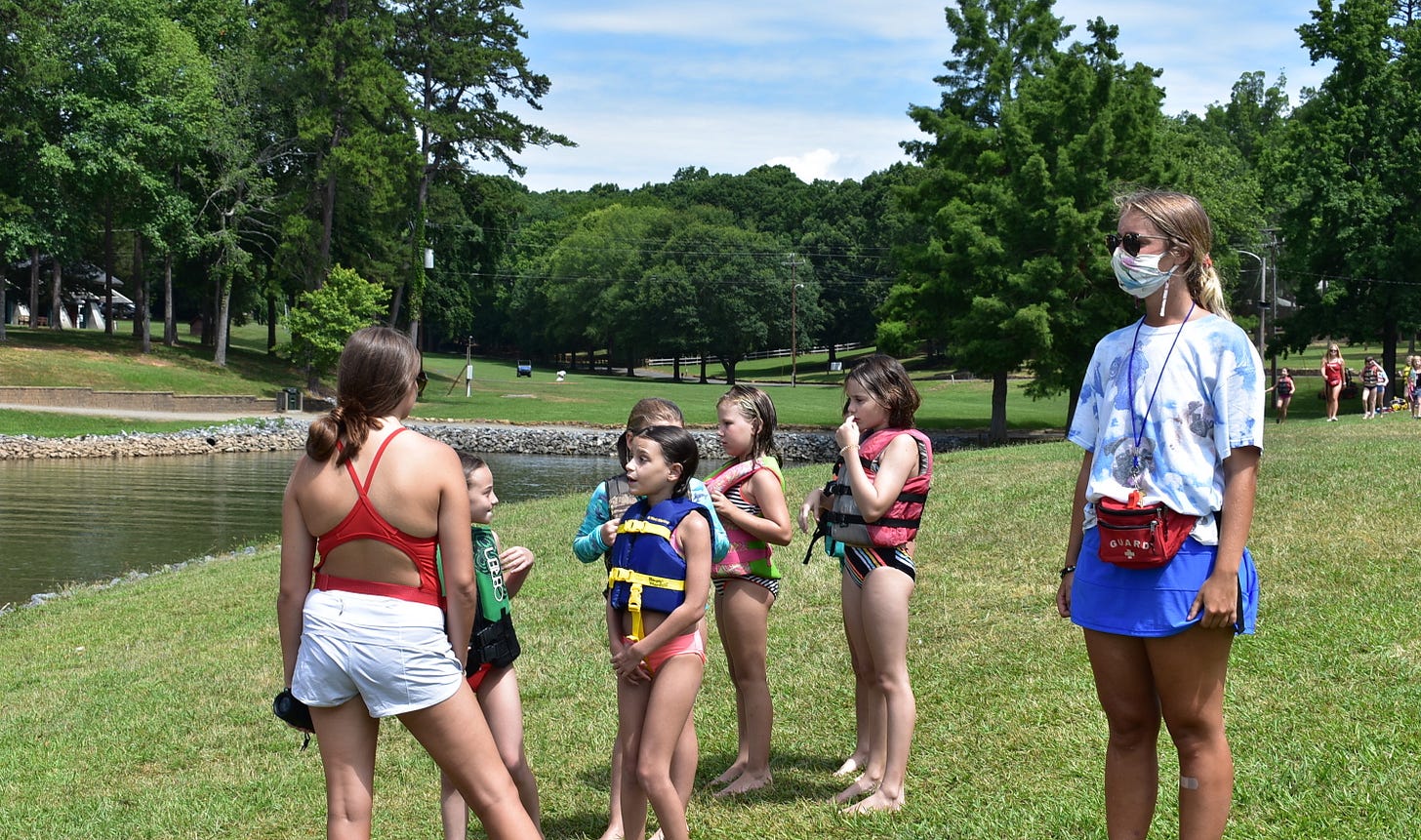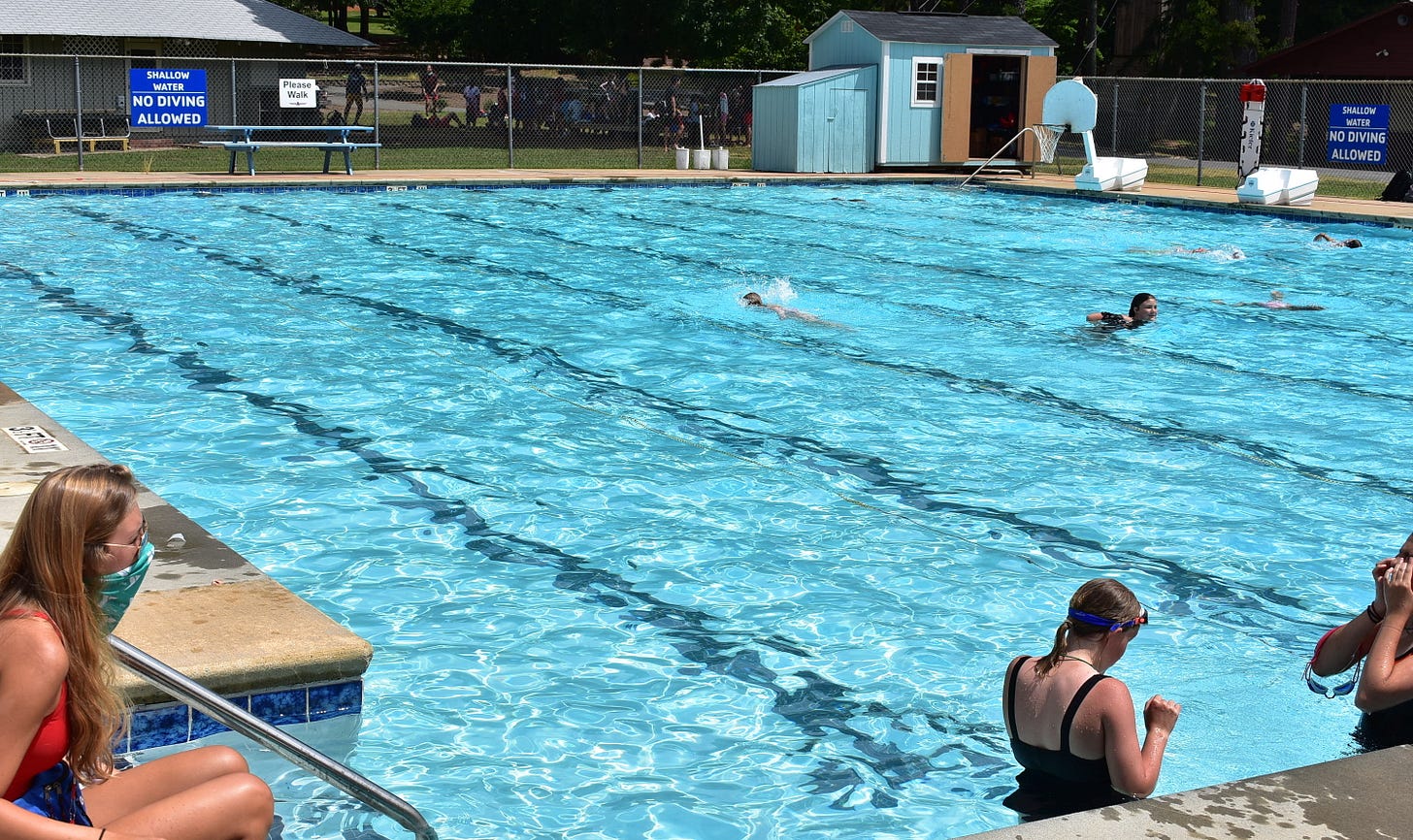Summer camp looks different this year
Plus: Summer work-from-home tips to save on power bills; 'More modern design' for Bojangles means no apostrophe; How CMPD plans to enforce new face covering order; Restrooms to reopen at county parks
Good morning! Today is Saturday, June 27, 2020. You’re reading The Charlotte Ledger, an e-newsletter with local business-y news and insights for Charlotte, N.C.
If you like what you see, please forward to a friend.
Need to subscribe? Sign up for free here (charlotteledger.substack.com). A paid subscription, starting at $9/month, gives you access to all articles and helps build smarter original, local news in Charlotte. Details here.
Most sleep-away camps are canceled, but some run with temperature checks and to-go dining; Shift to ‘family retreat’ mode

by Cristina Bolling and Tony Mecia
At first glance, it looks and sounds like a pretty typical summer at Camp Thunderbird, a large day and overnight camp on the banks of Lake Wylie run by the YMCA of Greater Charlotte.
Arrows thwack into targets on a weekday morning and kids squeal during their turns on “the blob,” a large inflatable that propels campers into the air — and then into the cold lake water — when somebody lands on it after jumping from a tower above.
But much is different about overnight camp here and in camps across North Carolina this summer — yet another example of how Covid-19 has upended long-held traditions and forced programs to quickly rethink almost everything about how they operate. And it’s causing hand-wringing for parents, who perhaps need a break from their children even more this year than ever before.
What does that look like for camps? For starters, here are some of the changes at Camp Thunderbird:
The camp is seeing a drop of about a third of the number of “camper weeks” they typically see. Last year, the camp hosted about 3,700 camper weeks, but the number is lower this year both because of reduced capacity and a drop in demand.
Entire cabins are having to choose activities together and not mix with campers in other cabins. (Usually, individual campers can pick their daily activities and separate from their cabin mates during the day. This year, they can’t.)
All campers and staff undergo temperature checks twice daily.
The dining hall is closed, and all food is taken to-go.
All counselors and staff, including lifeguards, are wearing masks.
Covid-19 hit at a rough time for camp directors. Almost every aspect of summer camp, from how cabins would be arranged, to dining facilities, equipment sanitation and camper drop-off and pick-up had to be considered, and in most cases, modified.
Procedures needed to be put in place to deal with potential Covid-19 infections. Camp Thunderbird is partnering with Atrium Health to staff its medical center, and any camper or staffer with a temperature above 99.4 degrees is sent to the medical center for evaluation.
Through the first three weeks of camp, there have been no cases of Covid-19 reported. One camper was sent home early because after he arrived at camp, it was discovered that he had come into contact with someone who had coronavirus before leaving for camp, said Kimberly Conroy, Camp Thunderbird’s executive director.
All of the new procedures and safety changes had to be communicated to anxious parents who worried about their children contracting coronavirus while away at camp and bringing it home to their families.
Needed more than ever? For camp directors and many parents, there’s a feeling that camp this year is more essential than ever because it gives kids a break from the heaviness of life during the pandemic. And for campers for whom summer camp is a yearly ritual, it’s one routine that can stay the same in a life that’s been altered in most other ways.
“From a kid’s perspective, they’re getting to do something different than they’ve gotten to do for three months,” Conroy said. “I would actually bet it’s more fun for them this year than any other year, because they’re so excited to be out.”

Lifeguard Haley Hutchings of Atlanta supervises the much-less-crowded-than-usual swimming pool at Camp Thunderbird. The camp requires lifeguards and counselors to wear masks. “We’re doing the best we can with our masks,” Hutchings says. “The kids are having a lot of fun, and that’s all that matters.”
Camps switch to family mode: North Carolina is known nationally for the volume and quality of its summer camps.
In fact, one four-county region in western North Carolina is so filled with camps that it’s known as “the Silicon Valley of camps,” says Sandi Boyer, executive director of the N.C. Youth Camp Association, an organization of about 100 camps that advocates on behalf of the camp industry.
(Those counties packed with camps are Buncombe, Transylvania, Henderson and Haywood, which are home to more than 75 camps and have an economic impact of some $365M a year, Boyer said.)
Many are struggling.
Of the 100 camps Boyer represents, only 35% are running their traditional camp programs this summer. Some 60% of camps are staying in business by operating “family retreats” in which families come to camp together and move through activities as a unit, she said. About 5% aren’t opening at all.
“They will be taking a huge financial hit whether they decided to do family camp or whether they decided to do traditional camp,” Boyer said.
“They only have seven to 10 weeks every year to make 99% of their revenue. Unlike any other business industry, there is no other time in the year when they can make that up.”
‘Favorite part of summer’: The decision of whether to send their children to camp was a tough one for some parents, many of whom had signed their kids up months before the pandemic started and then had to reevaluate that plan.

Campers at Camp Thunderbird are assigned their own life jackets for the week, to prevent sharing and potentially spreading the coronavirus. Kayaking and canoeing on Lake Wylie remain popular.
Cameron Felty, 14, had been looking forward to her fourth year at Camp Thunderbird, where she reunites with her four “camp friends” who span two states and go all year without seeing one another.
For Cameron’s parents, Lisa and Joe, it was a tough call to make. They’ve been taking the quarantine seriously as a family, and the idea of letting Cameron loose at a big camp full of kids and adults seemed unnerving.
But when they looked at the safety precautions Camp Thunderbird was taking and talked to other camp friend families, they decided to go ahead. They dropped Cameron off June 21 for a two-week session.
“I still get nervous about it. What if she goes and gets sick?” Lisa Felty said. “But we thought the safety measures they were taking were enough. They are doing everything they possibly can to keep them safe.
“It’s her favorite part of summer,” Felty said. “It would have been a huge blow, on top of everything else the kids have had to not do.”
The Feltys knew they had made the right call when they arrived at camp to drop Cameron off.
They’d already hugged goodbye in their south Charlotte driveway, knowing there’d be no long farewell at camp.
Instead of settling Cameron into her cabin and setting up her bunk bed, Joe and Lisa had to remain planted in their car seats while Cameron’s temperature was checked and camp staff went through Covid-19 screening questions, verified contact information and unloaded Cameron’s belongings.
“She jumped out of the car, and that was that,” Lisa Felty said. “She didn’t even look back.”
Reach managing editor Cristina Bolling: cristina@cltledger.com
Share The Ledger with a friend:
Today’s supporting sponsors are Soni Brendle…

… and CXN Advisory, a Charlotte-based firm that provides coaching, goal-setting and strategic advisory services for leaders of early-stage and high-growth organizations. Subscribe to CXN’s Set The Boat newsletter for regular leadership insights.

Home all day + summer heat = high energy bills. Here’s what to do.
Summer is here. More people are at home all day. That’s going to mean bigger electric bills.
Since the pandemic started in March, residential energy use during the week has looked more like a typical Saturday or Sunday, Duke Energy says. Instead of peaks in the morning and evening, energy is being consumed more evenly throughout the day since more people are home from work.
“We’ve seen a small increase, but it’s definitely noticeable that we are seeing that across the board,” says Duke spokesman Jeff Brooks. “That’s going to continue as long as people are working at home, and as we are moving into what are traditionally the highest usage months of the year.”
Brooks offers these tips to save some money on your electric bill this summer:
Make sure your air filter is clean. Your AC won’t have to work as hard.
Use a ceiling fan. Fans use much less energy than AC. But they cool people, not rooms.
Raise the AC a few degrees, if you can stand it. Air conditioners are the biggest energy hogs in a home.
Run your washing machine and dishwasher only when they’re full. That will cut down on loads. Using cold water also helps.
Switch out old light bulbs. Looking for another around-the-house project? Replace old bulbs with energy-efficient ones.
Instead of watching TV, switch to phones or tablets for binge-watching. You might not be able to see as much definition on John B.’s pecs when streaming “Outer Banks,” but at least you’ll save some energy.
Close your blinds on the sunny side of the house during the day. You don’t have to go full vampire, but the extra heat makes your AC work harder.
There probably no single move you can make that will save a lot. But every little bit counts.
“Those kinds of things add up,” Brooks says. “It all can add up to a more noticeable bill.” —TM
Investigation confirms something’s missing from Bojangles’
Big news out of Bojangles’: The Charlotte-based chicken chain has quietly dropped the apostrophe after its name. The company will now be known simply as Bojangles.
The apostrophe after the “S” always seemed like a mystery, just hanging out after the name like an unnecessary appendage — unlike Wendy’s and McDonald’s, whose possessives always seemed neater and more straightforward.
As recently as Feb. 6, the company’s Twitter account was proclaiming: “It’s spelled with an apostrophe on the end.”
An astute Ledger reader pointed out the apparent difference a couple weeks ago, and we’ve been trying to get an answer to this burning question ever since. We finally succeeded on Friday.
A company spokesperson told The Ledger in an email:
Thanks for your keen eye. Yes, you’re right! Bojangles has dropped the apostrophe in our name and updated the logo to reflect a fresh, more modern design. We’re slowly but surely updating packaging and other elements to show off our new look.

So long, Bojangles’. Long live Bojangles.
In brief:
Mask enforcement: Charlotte Mecklenburg Police plans to issue citations to businesses for violations of the new face covering mandate only after spending “educational time to make sure they understand what they’re supposed to be doing,” Deputy Chief Jeff Estes said Friday. “I do suspect there will be some issues with people who don’t agree with the face covering mandate and who will get into disputes with businesses.” Those customers could be charged with trespassing. The new rules went into effect Friday at 5 p.m. and require businesses to ensure that customers are wearing face coverings if they might be within 6 feet of others.
New from the Ledger Covid-19 Data Room:
Mecklenburg hospitalizations still heading upward; state numbers flat the last few days
What counts as a “hospitalization,” anyway?
Park relief: Mecklenburg County plans to reopen restrooms at all county parks on July 6, County Manager Dena Diorio said Friday. “We’ve been getting a lot of requests for that,” she said.
Grants available: Small storefront businesses within two miles of uptown can now apply for grants up to $40,000 from the Center City Small Business Innovation Fund, an effort to spur and support innovation during the Covid-19 crisis and economic downturn. The program launched with $2M from Honeywell in partnership with Foundation for the Carolinas. Bank of America and Duke Energy have also announced contributions in recent days. Apply here. (Charlotte Center City Partners)
Merger scrapped: A planned merger between Ally Financial and Cardholder Management Services Inc., or CardWorks, is off because of “unprecedented economic and market conditions” resulting from the Covid-19 pandemic, according to Ally CEO Jeffrey Brown. The $2.65B deal was announced in February and was scheduled to close in 3Q. (Biz Journal, subscriber-only)
School reopening vote: The N.C. Senate voted Friday to give school districts the flexibility to operate on a hybrid remote and in-person capacity because of the coronavirus pandemic. Last month, state officials outlined three reopening options: one with minimum social distancing restrictions, one with schools operating at 50% capacity and one where no students would return to buildings. However, Charlotte-Mecklenburg Schools officials warned that current state law doesn’t allow for remote learning time to count toward required minimums. Friday’s vote takes care of that hitch. Gov. Roy Cooper is expected to announce on Wednesday which of the three reopening options schools will undergo this fall. (WFAE)
Census data: New census data released this week shows that Mecklenburg County’s Hispanic and black populations grew at higher percentages than its white population during the last decade. From 2010 to 2019, the county’s Hispanic population grew 36%, and the black population rose 24.5%. The county’s white population grew 9.5%. White residents make up 46.1% of the county’s 1.1M population, while Hispanic residents make up 13.8% and black residents make up 32%. (Observer)
Recap: Last night’s 40 Over 40 Awards Gala
Last night’s Charlotte Ledger 40 Over 40 Awards Gala from the exclusive Quail Hollow Club is now available on video. Join hosts Tony Mecia and Cristina Bolling, as well as celebrity guests, as they honor 40 Charlotteans aged 40+ who are making a difference in our community:
Rave reviews are already pouring in:

We’ll send an email Monday with the full list of award recipients.
A thank you to our Premium subscribers
The Ledger is able to deliver original, local information to you because of the support of our sponsors and paying subscribers. We are grateful for them.
Today, we want to give special recognition to our Premium-level subscribers. Premium subscriptions are for companies, groups and individuals willing to give more in exchange for a few extras — and also to lend support to the new model of local journalism that The Ledger represents.
They pay $379/year, which comes with newsletters for up to six email addresses, a monthly public thank-you (if desired) and an invitation to 1-2 events per year (on hold for now, for obvious reasons).
A special thank you to:
ATCO Properties
Carroll Financial
Charlotte Agenda
Crescent Communities
Drew Long Productions
Eric Moore, LLC
Foundation For The Carolinas
Greenway Wealth Advisors LLC
Ann Doss Helms
John Miller Law Firm, PLLC
K&L Gates LLP
Levine Properties
McGuireWoods LLP
MVA Public Affairs
Next Stage
Nichols Architecture, PA
Northwood Office
OrthoCarolina
SignatureFD
Tassel Capital Management Inc.
T.R. Lawing Realty Inc.
Tribek Properties
Stuart Watson, ManListening Podcast
For more information on paid subscriptions to The Ledger, check out this post.
Need to sign up for this e-newsletter? Here you go:
Got a news tip? Think we missed something? Drop us a line at editor@cltledger.com and let us know.
Like what we are doing? Feel free to forward this along and to tell a friend.
Archives available at https://charlotteledger.substack.com/archive.
On Twitter: @cltledger
Sponsorship information: email editor@cltledger.com.
The Charlotte Ledger is an e-newsletter and web site publishing timely, informative, and interesting local business news and analysis Mondays, Wednesdays, Fridays and Saturdays, except holidays and as noted. We strive for fairness and accuracy and will correct all known errors. The content reflects the independent editorial judgment of The Charlotte Ledger. Any advertising, paid marketing, or sponsored content will be clearly labeled.
Executive editor: Tony Mecia; Managing editor: Cristina Bolling; Contributing editor: Tim Whitmire; Reporting intern: David Griffith



Just confirms that the government cannot control the virus. The lockdowns in March only served to prolong the season of the virus. The government collapsed the economy and did nothing to the infection rate. Let the kids play or they will become hypochondriacs.